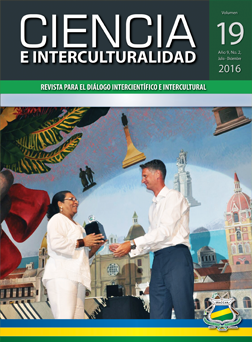Reconstrucción del Machil en el Pwelmapu: saber y poder
Palabras clave:
machi, logko, pliegues del conocimiento, legitimación.Resumen
Se ha indagado sobre el sistema de salud tradicional del pueblo mapuche llamado bawehtuwün, las características interculturales que tuvo el machil en el Pwelmapu, su desarrollo, transformación y desaparición. Se busca la reconstrucción de la memoria de las comunidades, las pijan kushe, los logko gijatufe y dirigentes políticos, en el fütal mapu, identidad territorial del este de la cordillera, llamada Pwelmapu. En dicho territorio, el rol de machi, la institución más importante religiosa y espiritual que tiene el pueblo mapuche, ha desaparecido desde hace 40 años.
El enfoque etnográfico fue desde una perspectiva de investigador nativo del pueblo mapuche. Los instrumentos de recolección fueron entrevistas individuales semiestructurada, el pentukun, círculos de conocimientos, participación emocionante y para la transcripción se trabajó con interpretación sociolingüística.
Los resultados reflejan que las manifestaciones de los machis, en la salud aún se practican. Los niños entre 9 y 12 años aun practican el habla, pero no viven en el área rural, sino en la ciudad y las familias no hablan mapuzungun, por lo cual el rol se está transformando. Otro resultado es que las autoridades espirituales, no han puesto como condición el habla del mapuzungun como característica propia cultural, sino que lo estiman como una capacidad que se puede aprenderse en el proceso de mapuchización, volver a hablar la lengua nativa. Pero sí, han priorizado como condición cultural el küpan y el tuwün. La castellanización y la evangelización han desgastado prácticas rituales, espirituales y sistema de creencias en el pueblo mapuche en el Pwelmapu; sin embargo, el llamado de machi puede darse en una persona que no habla mapuzungun, aunque en su proceso de formación deberá aprenderlo para ser legitimada socialmente.
Summary
We have investigated about the traditional health system of the Mapuche people known as bawehtuwün, the intercultural characteristics that the machil had in the pwelmapu, their development, transformation and disappearance. We are seeking for the reconstruction of the memory of the communities, the pijan kushe, the logko gijatufe and their political leaders, in the fütal mapu; we also inquired about the territorial identity of the eastern mountain range, known as pwelmapu. In this territory, the role of the most important religious and spiritual institution that the Mapuche people has –the machi-, have disappeared for 40 years.
The ethnographic approach was based from a perspective of a native researcher of the Mapuche people. The instruments of data collection included semi-structured individual interviews, the pentukun, circles of knowledge, exciting participation of the people, and for the transcription we worked with sociolinguistic interpretation.
The results indicate that the health manifestations of the machis are still been practiced. Children between 9 and 12 years still practice the speaking, but they do not live in rural areas, they live in the city, and families are not speaking mapuzungun, so all of these factors tends to changing of the role. Another result demonstrate that the spiritual authorities have not impose or set as a special condition to talk mapuzungun as their own cultural characteristic, but rather they consider it as a capacity that can be learned in the process of mapuchization, to speak their native language again. Nevertheless, yes they have prioritized as cultural condition the küpan and the tuwün. Castellanization and evangelization have worn-out spiritual practices, rituals and belief systems in the Mapuche people in pwelmapu; however, the machi call can also occur in a person who does not speak mapuzungun, although later on in their training process they must learn it in order to be socially legitimized.

